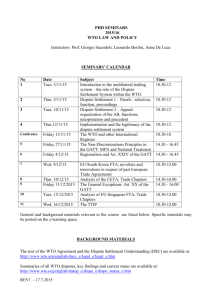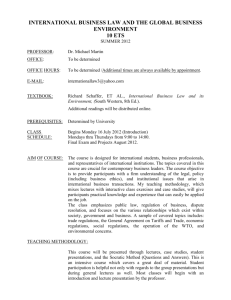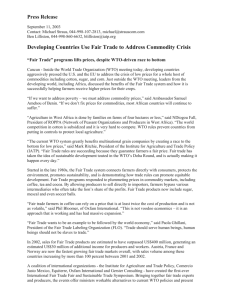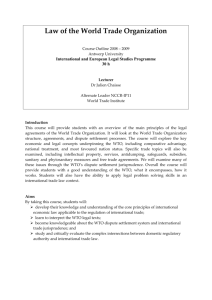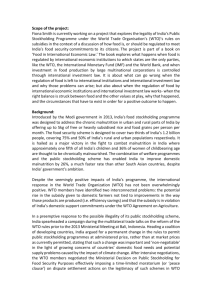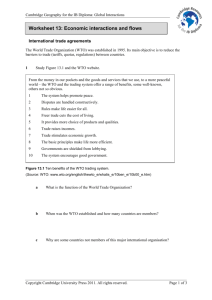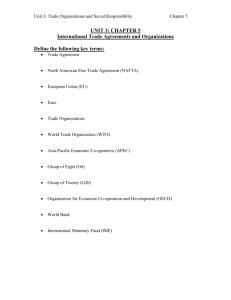Evaluating the Critique that WTO Retaliation Rules undermine the
advertisement
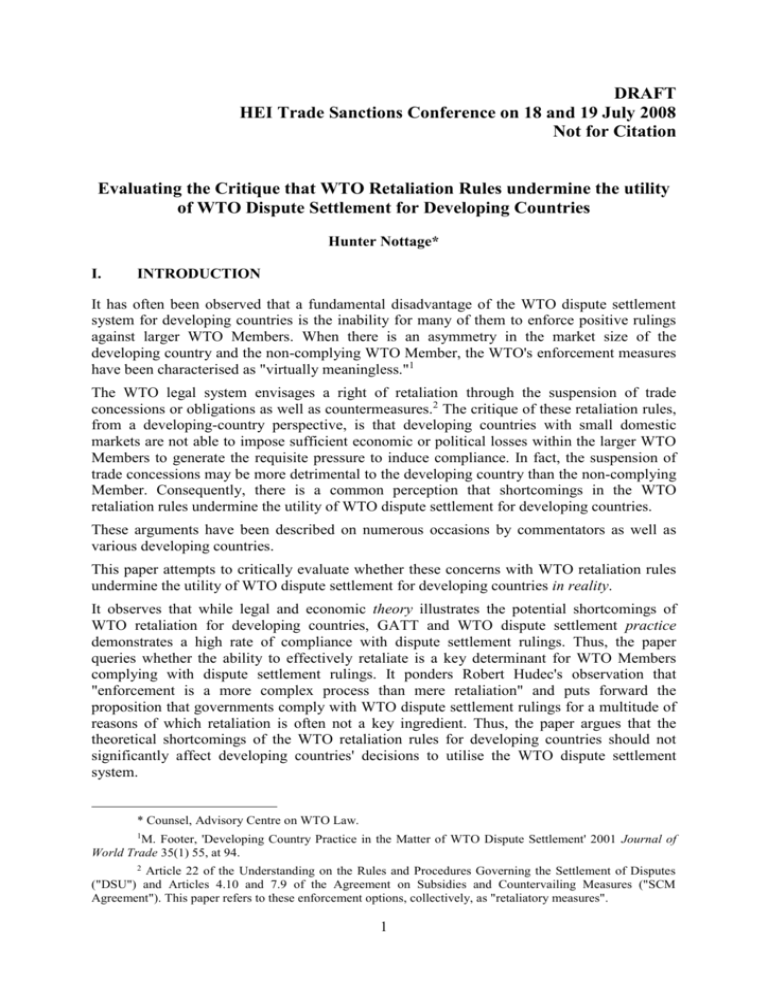
DRAFT HEI Trade Sanctions Conference on 18 and 19 July 2008 Not for Citation Evaluating the Critique that WTO Retaliation Rules undermine the utility of WTO Dispute Settlement for Developing Countries Hunter Nottage* I. INTRODUCTION It has often been observed that a fundamental disadvantage of the WTO dispute settlement system for developing countries is the inability for many of them to enforce positive rulings against larger WTO Members. When there is an asymmetry in the market size of the developing country and the non-complying WTO Member, the WTO's enforcement measures have been characterised as "virtually meaningless."1 The WTO legal system envisages a right of retaliation through the suspension of trade concessions or obligations as well as countermeasures.2 The critique of these retaliation rules, from a developing-country perspective, is that developing countries with small domestic markets are not able to impose sufficient economic or political losses within the larger WTO Members to generate the requisite pressure to induce compliance. In fact, the suspension of trade concessions may be more detrimental to the developing country than the non-complying Member. Consequently, there is a common perception that shortcomings in the WTO retaliation rules undermine the utility of WTO dispute settlement for developing countries. These arguments have been described on numerous occasions by commentators as well as various developing countries. This paper attempts to critically evaluate whether these concerns with WTO retaliation rules undermine the utility of WTO dispute settlement for developing countries in reality. It observes that while legal and economic theory illustrates the potential shortcomings of WTO retaliation for developing countries, GATT and WTO dispute settlement practice demonstrates a high rate of compliance with dispute settlement rulings. Thus, the paper queries whether the ability to effectively retaliate is a key determinant for WTO Members complying with dispute settlement rulings. It ponders Robert Hudec's observation that "enforcement is a more complex process than mere retaliation" and puts forward the proposition that governments comply with WTO dispute settlement rulings for a multitude of reasons of which retaliation is often not a key ingredient. Thus, the paper argues that the theoretical shortcomings of the WTO retaliation rules for developing countries should not significantly affect developing countries' decisions to utilise the WTO dispute settlement system. * Counsel, Advisory Centre on WTO Law. 1 M. Footer, 'Developing Country Practice in the Matter of WTO Dispute Settlement' 2001 Journal of World Trade 35(1) 55, at 94. 2 Article 22 of the Understanding on the Rules and Procedures Governing the Settlement of Disputes ("DSU") and Articles 4.10 and 7.9 of the Agreement on Subsidies and Countervailing Measures ("SCM Agreement"). This paper refers to these enforcement options, collectively, as "retaliatory measures". 1 The paper also examines the developing-country experience with WTO retaliation to date. Finally, it evaluates the extent to which the conventional arguments are potentially mitigated by developing countries cross-retaliating in areas such as intellectual property rights. II. THE CRITIQUE THAT WTO RETALIATION RULES UNDERMINE THE UTILITY OF WTO DISPUTE SETTLEMENT FOR DEVELOPING COUNTRIES The critique that shortcomings in WTO retaliation rules undermine the utility of WTO dispute settlement for developing countries is based on three arguments. Firstly, that developing countries with small domestic markets are not able to impose sufficient economic or political losses within the larger WTO Members to generate the requisite pressure to induce compliance. Secondly, that the suspension of concessions may be more detrimental to the developing country than the non-complying Member. Thirdly, as a consequence, WTO trade sanctions undermine the utility of WTO dispute settlement for developing countries. 1. Developing-country sanctions are not able to generate sufficient pressure to induce compliance Trade retaliation under the GATT and WTO has typically envisaged the withdrawal of tariff concessions with the effect of raised tariffs for specific imports from the non-complying Member. The theory being that by raising tariffs to inflict economic harm on exporters in the non-complying Member the respondent government will be placed under domestic pressure to remove the measures inconsistent with WTO law. This ideal scenario, however, is dependent upon the size of the domestic market of the retaliating Member in relation to that of the non-complying Member. The retaliation request of Antigua and Barbuda ("Antigua"), one of the smallest WTO Members with approximately 80,000 inhabitants, against the United States provides an illustration of retaliation difficulties where there is an asymmetry in market size. As Antigua stated in its request for retaliation, "ceasing all trade whatsoever with the United States (approximately US$180 million annually, or less than 0.02 per cent of all exports from the United States) would have virtually no impact on the economy of the United States, which could easily shift such a relatively small volume of trade elsewhere".3 A similar statement was made by the Arbitrators examining the ability of Ecuador to effectively retaliate against the European Communities ("EC") by withdrawing tariff concessions. Ecuador imports less than 0.1 per cent of total EC exports, leading the Arbitrator to observe that "given the fact that Ecuador, as a small developing country, only accounts for a negligible proportion of the EC's exports of these products, the suspension of concessions is unlikely to have any significant effect on demand for these EC exports".4 The Arbitrator then queried whether the objective of inducing compliance "may ever be achieved where a great imbalance in the terms of trade volume and economic power exists between the complaining party seeking suspension and the other party". 5 Recourse by Antigua and Barbuda to Article 22.2 of the DSU, United States – Measures Affecting the Cross-Border Supply of Gambling and Betting Services (US – Gambling), WT/DS285/22, 22 June 2007, para. 3. 3 Decision by the Arbitrators, European Communities – Regime for the Importation, Sale and Distribution of Bananas – Recourse to Arbitration by the European Communities under Article 22.6 of the DSU, WT/DS27/ARB/ECU, 24 March 2000, (herein EC – Bananas III (Ecuador) (Article 22.6 – EC)), para. 95. 4 5 Ibid, para. 73. 2 For these reasons, it has been observed that developing countries with small markets are unlikely to be able to induce compliance by larger trading Members. As one commentator stated, traditional retaliation "therefore cannot offer a realistic option to enforce WTO obligations if performed against considerably larger economies".6 2. Developing-country sanctions harm themselves A further concern with retaliation through the withdrawal of tariff concessions is that the remedy may in fact have detrimental effects on consumers and economic welfare in the retaliating Member. It has been commented that "[p]erhaps the biggest disadvantage of WTO sanctions is that they bite the country imposing the sanction". 7 Others rue that the suspension of concessions goes "against the very trade liberalising principles the GATT/WTO system stands for" and is "bad policy" that amounts to "shooting oneself in the foot".8 These criticisms were raised by Antigua and Ecuador in their requests for retaliation against the United States and the EC. Antigua is a small island with negligible natural resources making it heavily reliant on imports. As 50 per cent of those imports are from the United States, Antigua expressed concern that retaliating through import restrictions would have a "disproportionate adverse impact on Antigua and Barbuda by making these products and services materially more expensive to the citizens of the country".9 Retaliatory restrictions on goods or services from the United States were argued to have "a much greater negative impact on Antigua and Barbuda than it would on the United States".10 Similarly, the Arbitrator examining Ecuador's request for retaliation against the EC noted that "in situations where the complaining party is highly dependent on imports from the other party, it may happen that the suspension of certain concessions or certain other obligations entails more harmful effects for the party seeking suspension of concessions than for the other party".11 3. WTO retaliation rules are skewed against developing countries These two arguments have led to commentators and developing countries to contend that the WTO retaliation rules are skewed against developing countries. In the context of DSU Review negotiations, the LDC Group has commented that the "lack of an effective enforcement mechanism and the potential impact of retaliatory measures for poor 6 H. Grosse Ruse-Kahn, 'A Pirate of the Caribbean? The Attractions of Suspending TRIPS Obligations' 2008 JIEL 11(2), 313-364, at 332. 7 S. Charnovitz, 'Should the Teeth Be Pulled? An Analysis of WTO Sanctions', in D. L. M. Kennedy and J. D. Southwick, Political Economy of International Trade Law: Essays in Honor of Robert E. Hudec (Cambridge, UK: Cambridge University Press) 602-35 at 621. 8 M. Bronkers and N. Van den Brock, 'Financial Compensation in the WTO: Improving Remedies of WTO Dispute Settlement' 2006 JIEL 8(1) 101-126, at 103. See also P. Mavroidis, 'Remedies in the WTO Legal System: Between a Rock and a Hard Place', 11 Eur. J. Int'l. Law, 1 (2000) and B. Hoekman and P. Mavroidis, WTO Dispute Settlement, Transparency, and Surveillance, World Bank, Nov. 1999, at 6. Recourse by Antigua and Barbuda to Article 22.2 of the DSU, United States – Measures Affecting the Cross-Border Supply of Gambling and Betting Services (US – Gambling), WT/DS285/22, 22 June 2007, paras. 2-3. 9 10 Ibid, paras. 2-3. 11 Decision by the Arbitrators, EC – Bananas III (Ecuador) (Article 22.6 – EC), para. 73. Also see para. 86. 3 economies is well documented".12 The African Group, similarly, has observed that one of the "major problems" African Members face in utilizing the WTO dispute settlement is that "the means provided for enforcement of findings and recommendations (trade retaliation) are skewed against and disadvantage African Members".13 According to those Members, the "realities are such that developing-country Members cannot practically utilise this ultimate sanction" as "they would probably suffer further injury if they adopted retaliatory measures".14 Commentators appear to agree. It has been observed that the WTO "sanctioning power tends to favour large economies over smaller ones",15 that "as a practical matter" trade sanctions "can probably only be adopted by developed country Members, or large, advanced developing countries",16 and that "the adoption of countermeasures is simply not an option for the poorer WTO Members".17 Trade retaliation by developing countries against industrialised countries has been characterised as "not available to them, with the possible exception of the largest among them",18 and "counterproductive" as they "would mostly harm the former, not induce compliance by the latter".19 For all these reasons, it has been argued that "countermeasures are a more or less ineffective instrument in the hands of 'smaller' players"20 and that "there is indeed a practical problem for small countries and developing countries when they attempt to carry through with effective retaliation within the WTO system".21 The WTO World Trade Report for 2007 synthesises these various critiques in the following manner: In applying retaliatory measures, large countries can cause economic harm to the party found not to be in compliance with its obligations.... [c]onversly, small countries, in view of their limited size are unable to exert sufficient pressure on larger Members to alter their behaviour.22 4. WTO retaliation rules undermine the utility of WTO dispute settlement for developing countries The final element in the critique is that WTO retaliation rules skewed against developing countries undermine the utility of the WTO dispute settlement system for those countries. 12 TN/DS/W/17, paras. 12 and 15. 13 TN/DS/W/15, paras. 2 and 6. 14 Ibid. 15 S. Charnovitz, 'Should the Teeth Be Pulled? An Analysis of WTO Sanctions', in D. L. M. Kennedy and J. D. Southwick, Political Economy of International Trade Law: Essays in Honor of Robert E. Hudec (Cambridge, UK: Cambridge University Press) 602-35 at 625. 16 Y. Renouf, 'A Brief Introduction to Countermeasures in the WTO Dispute Settlement System', p. 118. 17 P. Mavroidis, 'Remedies in the WTO Legal System: Between a Rock and a Hard Place', 2000 Eur. J. Int'l. Law 11(4), 763-813. 18 M. Bronkers and N. Van den Brock, 'Financial Compensation in the WTO: Improving Remedies of WTO Dispute Settlement' 2006 JIEL 8(1) 101-126, at 102. 19 J. Pauwelyn 'Enforcement and Countermeasures in the WTO: Rules are Rules - Towards a More Collective Approach' 2000 American Journal of International Law 94(2), pp. 335-47, at 338 (albeit that Pauwelyn merely poses the question). 20 K. Bagwell, P. Mavroidis, R. Staiger, The Case for Tradable Remedies in WTO Dispute Settlement (Washington, DC: World Bank Policy Research Paper No. 3314, 2004), at 14-15. 21 P. Mavroidis, 'Remedies in the WTO Legal System: Between a Rock and a Hard Place', 2000 Eur. J. Int'l. Law 11(4), 763-813. 22 World Trade Report 2007, WTO, at 284. 4 This linkage between the WTO retaliation rules and the utility of WTO dispute settlement is based on the premise that one of the "main attractions" of WTO dispute settlement system is that "it explicitly envisages remedies in the event of continued non-compliance when a country loses a dispute settlement procedure".23 This premise results in what has been characterised as the "conventional wisdom" that it is "a waste of time and money for developing countries to invoke the WTO's dispute settlement procedures against industrialised countries" because "the developing country has no effective way to enforce the ruling".24 The inability of developing countries to effectively retaliate has been argued to mean that their access to WTO dispute settlement "is not equal to that of developed countries, and in fact largely illusory".25 Certainly, in the context of DSU Review negotiations, the LDC Group noted that "the question of little or no utilisation of the DS by developing and least-developed country Members has been linked to the inadequacies and structural rigidities of the remedies available to poor countries".26 The LDC Group recommending that changes are required in order to "enable LDCs to use the DS meaningfully".27 The concern that shortcomings in the WTO retaliation rules for developing countries undermine the utility of the WTO dispute settlement for those countries may explain the various proposals by developing countries for review of those enforcement provisions. DSU Review proposals including promoting the use of compensation,28 as well as introducing collective retaliation29 and tradeable retaliation rights.30 III. AN EVALUATION OF THE CRITIQUE A. EVEN SKEWED WTO RETALIATION RULES DO NOT UNDERMINE WTO DISPUTE SETTLEMENT FOR DEVELOPING COUNTRIES THE UTILITY OF The arguments that the current WTO retaliation rules are skewed against developing countries appear to have considerable merit. The positions articulated by Antigua and Ecuador in the WTO regarding the economic costs of trade sanctions on developing countries are economically sound. It is also logical that traditional trade sanctions imposed by developing countries with small markets are unlikely to generate significant economic or political losses in larger non-complying Members. 23 M. Bronkers and N. Van den Brock, 'Financial Compensation in the WTO: Improving Remedies of WTO Dispute Settlement' 2006 JIEL 8(1) 101-126, at 101. 24 R. Hudec, 'The Adequacy of WTO Dispute Settlement Remedies: A Developing Country Perspective' in B. Hoekman, A. Mattoo, P. English Development, Trade and the WTO (Washington D.C., World Bank), at 81. 25 M. Bronkers and N. Van den Brock, 'Financial Compensation in the WTO: Improving Remedies of WTO Dispute Settlement' 2006 JIEL 8(1) 101-126, at 106. 26 TN/DS/W/17, para. 12. 27 Ibid. 28 E.g. TN/DS/W/33 (Ecuador), TN/DS/W/17 and TN/DS/W/37 (LDC Group) and TN/DS/W/15 and TN/DS/W/42 (African Group). 29 E.g. TN/DS/W/47 (India, Cuba, the Dominican Republic, Egypt, Honduras, Jamaica and Malaysia). 30 E.g. TN/DS/W/23 (Mexico). 5 The consequential argument that these deficiencies undermine the utility of the WTO dispute settlement system for developing countries is, however, more controversial. Two differing perspectives can be discerned. On the one hand, a number of studies and commentaries contend that the capacity to retaliate is a critical component in ensuing that WTO Members comply with dispute settlement rulings. These analyses suggest that, if developing countries do not have the capacity to credibly retaliate, the likelihood of developing countries achieving successful outcomes through WTO dispute settlement is undermined. One empirical analysis all GATT and WTO disputes between 1973 and 1998 finds "substantial evidence that the threat of retaliation is an important influence determining a defendant country's ability to credibly commit to liberalisation".31 Its results were interpreted to "suggest that the successful economic resolution to disputes is influenced by the concern for retaliation".32 Another study finds that "implementation is much more likely in a developed against developing country scenario than vice-versa".33 As a result, that study concludes that "there is indeed a problem in the functioning of the DSU in this respect" and that proposals to reform the retaliation rules to address these failings "are addressing a real issue and not a ghost". 34 The WTO World Trade Report for 2007 reflects the view that "retaliation fails to deter economically powerful countries from committing a violation against small countries".35 On the other hand, other evaluations of the GATT and WTO dispute settlement data demonstrate a high rate of compliance with WTO dispute settlement rulings. One analysis of the first ten years of the WTO dispute settlement system indicates a successful implementation rate of adopted panel and Appellate Body reports of 83 per cent.36 Only 10 of the 181 initiated disputes examined resulted in no implementation or disagreement over implementation.37 As the author of that analysis concluded, "it is the case that most reports are eventually implemented".38 A separate study, covering the period until March 2007, describes the "generally positive record of Members in complying with adverse rulings". That study notes that of 109 panel and Appellate Body reports adopted during that period, 90 per cent found violations of WTO law, and that in "virtually all of these cases the WTO Member found to be in violation indicated its intention to bring itself into compliance and the record indicates that in most cases has already done so".39 A key finding for the purposes of this paper is that these high compliance rates with adverse DSB rulings are not limited to those disputes brought by developed countries. Similar compliance rates have been observed when smaller and developing countries have obtained favourable rulings. As one study recently found: 31 C. Bown, 'On the Economic Success of GATT/WTO Dispute Settlement', 2004 Review of Economics and Statistics 86, [at 17]. 32 Ibid., at 4. 33 K. Bagwell, P. Mavroidis, R. Staiger, The Case for Tradable Remedies in WTO Dispute Settlement (Washington, DC: World Bank Policy Research Paper No. 3314, 2004), at 4. 34 Ibid, at 4. 35 World Trade Report 2007, WTO, at 284. 36 W. Davey, 'The WTO Dispute Settlement System: The First Ten Years' 2005 JIEL 8(1) 17, at 46-48. 37 Ibid, at 47. The figure of 83 percent was derived from the implementation of 48 out of the 58 disputes that resulted findings of violation of WTO law. Ibid. at footnotes 114 and 115. 38 W. Davey, 'The WTO: Looking Forwards' 2006 JIEL 9(1) 3, at 12 39 B. Wilson, 'Compliance by WTO Members with Adverse WTO Dispute Settlement Rulings' 2007 JIEL 10(2) 397, at 397. 6 WTO dispute settlement experience to date does not suggest that responding Members have a manifestly worse record of compliance with DSB rulings in cases where the complaining Member was a small or developing country than in cases where the complaining Member was another type of developing country or developed country.40 This practice of high compliance with dispute settlement rulings, even when the complainant is a small or developing country, is hard to reconcile with the abovementioned perspective that the capacity to retaliate is an "important influence" in the resolution of WTO disputes. If retaliation were a material factor for compliance with adverse rulings, one would expect low rates of compliance in those disputes where smaller or developing countries were complainants. Based on the high compliance rate with dispute settlement rulings, even when the complainant is a small or developing country, this paper puts forward the proposition that the capacity to effectively retaliate may not be a significant a factor for government compliance with adverse panel and Appellate Body rulings. GATT practice supports this proposition. One of the key distinctions between dispute settlement under the GATT and the WTO was that GATT dispute settlement procedures required consensus permitting the defendant to veto both adverse rulings and any request for retaliation. As the defendant had the ability to veto retaliation, under the GATT regime complainants effectively did not have the capacity to retaliate against countries that did not wish to comply with adverse rulings.41 Thus, GATT practice appears to provide an environment to test the extent to which the capacity to retaliate induces compliance with adverse rulings. GATT practice suggests that retaliation capacity is not a necessary component for compliance. Hudec's comprehensive study of GATT disputes found "almost a 100 percent success rate" in producing satisfactory responses to legal rulings in the first three decades of the GATT.42 While this fell to 81 per cent in the following period it was characterised as "still a very impressive performance for an international legal regime". Significantly, 10 of the 11 GATT panel rulings in favour of developing countries had a successful outcome. Hudec's interpretation of this data was the following: The paradoxical contrast between the voluntary procedures and weak remedies of the GATT dispute settlement system, on the one hand, and its rather strong record of success, on the other, contains a lesson. It teaches that the enforcement of international legal obligations cannot be explained by superficial analysis of dispute settlement procedures and remedies.43 40 R. Malacrida, 'Towards Sounder and Fairer WTO Retaliation: Suggestions for Possible Additional Procedural Rules Governing Members' Preparation and Adoption of Retaliatory Measures' 2008 JWT 42(1) 3-60, at 20. 41 In fact, in GATT practice retaliation was only authorised on one occasion. See Determination by the CONTRACTING PARTIES of 8 November 1952, Netherlands Measures of Suspension of Obligations to the United States, BISD 1S/32-33. On four other occasions, the requests for retaliation authority were vetoed. See, e.g., the request vetoed by the United States following the adverse ruling in the GATT Panel Report, United States – Taxes on Petroleum and Certain Imported Substances, L/6175, adopted 17 June 1987, BISD 34S/136. 42 R. Hudec, 'The Adequacy of WTO Dispute Settlement Remedies: A Developing Country Perspective' in B. Hoekman, A. Mattoo, P. English Development, Trade and the WTO (Washington D.C., World Bank), at 82. 43 Ibid. 7 While the lesson from this GATT practice ought to be tempered somewhat when applied to the WTO environment,44 the practice nonetheless suggests that there are factors other than retaliation capacity that result in governments complying with adverse dispute settlement rulings.45 According to Hudec, these other factors include that: (i) some parts of the defendant government and its constituents usually want the conduct found inconsistent with WTO law to be removed simply because it is good policy; (ii) the defendant government is likely to see a long-term value in preserving the legitimacy of the legal system for when it may need to rely on it for its own purposes; and (iii) the shaming pressure caused by other governments wishing to preserve the legitimacy of the legal system should not be underestimated.46 These factors would appear to apply equally in the WTO environment. WTO practice also illustrates that the high compliance rate observed in WTO dispute settlement practice has not required Members to regularly request or impose retaliatory measures. Of the sixty WTO disputes where retaliation was possible, as the reasonable period of time to comply had expired without compliance being achieved, Members only requested the right to retaliate in seventeen disputes.47 In only nine of the disputes the complainant pursued and gained retaliation rights from the DSB with retaliatory measures being imposed in only five of those disputes.48 Thus, while the DSB has authorised retaliation on occasion, it is seems fair to say that "retaliation has been the exception rather than the rule". 49 From these figures one might extrapolate that, even in the WTO environment where retaliation can no longer be vetoed, in the vast majority of disputes the catalyst for compliance does not appear to have been the threat of retaliation.50 As one observer noted, "the overall positive record of 44 It has been observed that as the GATT dispute settlement regime permitted defendants to block both the establishment of panels and the adoption of adverse panel reports "it is not surprising that if and when a contracting party accepted an adverse panel report... that contracting party then ordinarily went on to implement the ruling". R. Malacrida, 'Towards Sounder and Fairer WTO Retaliation: Suggestions for Possible Additional Procedural Rules Governing Members' Preparation and Adoption of Retaliatory Measures' 2008 JWT 42(1) 3-60, at 8. 45 If not, why was it that "the great majority of [GATT] violation rulings were in fact adopted" and that "the bulk of these violation rulings, including many of those not adopted, did produce a satisfactory correction of the practice at issue". See R. Hudec, 'The Adequacy of WTO Dispute Settlement Remedies: A Developing Country Perspective' in B. Hoekman, A. Mattoo, P. English Development, Trade and the WTO (Washington D.C., World Bank), at 82. 46 Ibid, at 82-83. 47 See R. Malacrida, 'Towards Sounder and Fairer WTO Retaliation: Suggestions for Possible Additional Procedural Rules Governing Members' Preparation and Adoption of Retaliatory Measures' 2008 JWT 42(1) 3-60, Table at Appendix B (with the addition of the request for authorisation to retaliate in US – Upland Cotton). 48 Ibid. 49 R. Malacrida, 'Towards Sounder and Fairer WTO Retaliation: Suggestions for Possible Additional Procedural Rules Governing Members' Preparation and Adoption of Retaliatory Measures' 2008 JWT 42(1) 3-60, at 7. 50 One the other hand, it might also be noted that on a number of occassions mutually agreed solutions were apparently reached after authorisation to request retaliation was made. Notably in Australia – Measures Affecting Importation of Salmon (DS18); Canada – Measures Affecting the Importation of Milk and Exportation of Dairy Products (DS103 and DS113); US – Section 110(5) of the US Copyright Act; US – Anti-Dumping Act of 1916 (DS136 and DS162); Japan – Measures Affecting the Importation of Apples (DS245); US – Final Countervailing Duty Determination with Respect to Softwood Lumber from Canada (DS257); and US – Investigation of the International Trade Commission in Softwood Lumber from Canada (DS277); US – Final Dumping Determination on Softwood Lumber from Canada (DS264); US – Oil Country Tubular Goods Sunset Reviews (DS268) [to check]. See R. Malacrida, 'Towards Sounder and Fairer WTO Retaliation: Suggestions for 8 Members in complying with adverse rulings is reflected in, and confirmed by, the low number of cases where Members have sought and received authorisation to impose retaliatory measures".51 The above analysis permits certain conclusions. First, that in both the GATT and the WTO there has been a high rate of compliance with adverse dispute settlement rulings. Second, that this high rate of compliance has occurred even in situations where the complainant had little capacity to effectively retaliate (whether because a developing country or because retaliation was subject to a veto under the GATT). Thus, the practice to date suggests that, even without effective retaliation capacity, WTO dispute settlement can still be an effective mechanism for developing countries wishing to remove legal violations by larger WTO Members. These conclusions are not to say that enforcement would not be more effective with retaliation capacity, it is simply to highlight that shortcomings in retaliation capacity may not significantly undermine the utility of WTO dispute settlement for developing countries. B. DEVELOPING COUNTRY PRACTICE WITH RETALIATION This section briefly examines developing-country experience with WTO retaliation to date. It observes that developing countries appear to have seen merit in requesting WTO retaliation on those occasions where compliance had not been achieved. It also notes that developing countries have only imposed retaliatory measures on one occasion. However, this may be due to circumstances particular to the relevant disputes as opposed to concerns that retaliatory measures would be both ineffective for, and harmful to, the relevant developing countries. As noted above, Members have requested authorization from the WTO Dispute Settlement Body ("DSB") to retaliate in seventeen disputes. The first observation that can be made is that of the thirteen Members that made these requests, eight were developing country Members.52 These developing countries had varying market sizes and trade shares.53 This suggests that that a spectrum of developing countries saw utility in at least requesting retaliation. Of these requests, nine disputes led to Arbitration proceedings under Article 22.6 of the DSU on the level of suspension of concessions or other obligations. Here again, developing countries pursued their right to retaliate through to the Arbitration stage in five of those disputes, suggesting that developing countries have seen merit in pursuing actual DSB authorisation to retaliate.54 This data illustrates that developing countries have been at least as active as developed countries in requesting authorisation from the DSB to retaliate. Results that may come as a surprise when one considers the conventional argument that WTO retaliation is "virtually meaningless" for developing countries. Possible Additional Procedural Rules Governing Members' Preparation and Adoption of Retaliatory Measures' 2008 JWT 42(1) 3-60, Table at Annex B. 51 B. Wilson, 'Compliance by WTO Members with Adverse WTO Dispute Settlement Rulings' 2007 JIEL 10(2) 397, at 397. 52 Antigua and Barbuda, Argentina, Brazil, Chile, Ecuador, India, Korea and Mexico. 53 Ibid. The disputes pursued by developing countries being: US – Upland Cotton (Article 22.6 - US), US – Gambling (Article 22.6 - US), US – Offset Act (Byrd Amendment) (Article 22.6 – US) (Brazil, Chile, India, Korea, Mexico), Canada – Aircraft Credits and Guarantees (Article 22.6 – Canada), and EC – Bananas III (Ecuador) (Article 22.6 – EC). 54 9 The area where there has been a marked discrepancy between developing-country practice and developed-country practice has been with the imposition of retaliatory measures. While four developed countries have imposed retaliatory measures (with developed countries imposing measures on eight of the ten occasions where they were granted authorisation), only one developing country, Mexico, has imposed retaliatory measures (with developing countries consequently imposing measures on only one of the eight occasions where they were granted such authorization).55 The question that arises is whether this difference in track record in the imposition of retaliatory measures is due to the limitations of the WTO retaliation rules for developing countries. In particularly, was the decision to not impose trade sanctions due to a realisation that the (i) developing-country sanctions would be ineffective at generating sufficient pressure to induce compliance, and (ii) developing-country sanctions would create greater harm to the developing country than the non-complying Member? This paper will finalise its analysis of this question following the conference held on July 18 and 19 at the HEI in Geneva where certain developing-country government officials will elaborate upon their governments' decisions with respect to the imposition to retaliatory measures. At this juncture, however, the following tentative observations are made: (a) EC – Bananas III (Ecuador) (Article 22.6 – EC) The United States imposed retaliatory measures up until July 2001 in EC – Bananas III (US) (Article 22.6 – EC) but Ecuador did not. Ecuador has made strong statements regarding the futility of WTO retaliation rules and these have been coupled with proposals for reform in the DSU negotiations.56 Nonetheless, was there a necessity for Ecuador to impose retaliatory measures as (i) the United States had already done so, and (ii) Ecuador managed to reach a settlement with the EC through the 2001 Bananas Understandings? (b) US – Offset Act (Byrd Amendment) (Article 22.6 – US) While one developing country imposed retaliatory measures (Mexico) other developing countries did not impose retaliatory measures (Brazil, Chile, India, Korea). In contrast, all involved developed-countries imposed retaliatory measures (EC, Japan, Canada). (c) Canada – Aircraft Credits and Guarantees (Article 22.6 – Canada) 55 Mexico imposed retaliatory measures in the context of U.S. - Offset Act (Byrd Amendment) (Article 22.6 – US). B. O'Connor, 'Remedies in the World Trade Organisation Dispute Settlement System – The Bananas and Hormones Cases' 2004 JWT 38(2), 245-266, at 249 ("Ecuador never made use of the possibility of applying sanctions against the European Communities on the basis that the harm to the Ecuadorian economy would outweigh the possible benefit of persuading the European Communities to comply with its commitments.") 56 10 Perhaps the decision to not impose retaliatory measures in this dispute was related to the results of Brazil – Aircraft (Article 22.6 – Brazil) whereby Canada was granted the right to retaliate against Brazil. In Canada – Aircraft Credits and Guarantees (Article 22.6 – Canada) Brazil was awarded US$247 million as a one-off amount. It has been observed that the amount awarded to Brazil was "very close to the amount awarded to Canada" in Brazil – Aircraft (Article 22.6 – Brazil).57 This situation has been given as an explanation for why retaliatory measures were not imposed by either Member.58 It has also been commented that "it is likely that, by awarding to Brazil an amount of countermeasures close to the amount of countermeasures awarded to Canada in the Brazil – Aircraft Article 22.6 arbitration, the arbitrator was attempting to create an incentive for parties to go back to the negotiating table."59 Certainly, the concluding paragraph of the award provides that "[t]he Arbitrator understands that the parties have been holding consultations. The Arbitrator is of the opinion that, given the particular circumstances of this case, a mutually satisfactory agreement between the parties addressing the issues dealt with in this case in their broader context would be the most appropriate solution."60 (d) US – Gambling (Article 22.6 – Antigua and Barbuda) Perhaps the decision to not impose retaliatory measures in this dispute was due to the United States decision to modify its services commitments through the procedures of Article XXI of the General Agreement on Trade in Services ("GATS"). By aligning its GATS commitments through modification of its schedule, Antigua's right to retaliate under the DSU would no longer be justified. Of course, Antigua would continue to have rights under the GATS regarding compensatory adjustments to the extent it is affected by the modification. The option of modification of scheduled commitments, as opposed to the domestic laws and practices, of a Member raises a number of questions of developingcountry relevance (e.g. the extent to which the capacity to cross-retaliate across agreements is affected). C. CONVENTIONAL WISDOM MAY NEED TO BE REVISITED WHERE DEVELOPING COUNTRIES CROSS-RETALIATE WITH INTELLECTUAL PROPERTY RIGHTS An interesting development in developing-country practice with retaliation has been requests to cross-retaliate through the suspension of obligations under the WTO Agreement on Trade 57 Y. Renouf, 'A Brief Introduction to Countermeasures in the WTO Dispute Settlement System', p. 120. 58 K. Bagwell, P. Mavroidis, R. Staiger, The Case for Tradable Remedies in WTO Dispute Settlement (Washington, DC: World Bank Policy Research Paper No. 3314, 2004), at 13 ("Canada did not impose countermeasures against Brazil most likely because Brazil could do the same in the same dispute (export subsidies in regional aircrafts where Bombardier and Embraer, Canadian and Brazilian producers respectively hold a join dominant position in the market)". 59 Y. Renouf, 'A Brief Introduction to Countermeasures in the WTO Dispute Settlement System', at 60 Award of the Arbitrator, Canada – Aircraft Credits and Guarantees (Article 22.6 – Canada), para. 121. 4.4. 11 Related Intellectual Property Rights ("TRIPS Agreement"). Article 22.3 of the DSU permits retaliation across agreements where retaliation under the same agreement would not be "practicable or effective". This possibility was first requested, and obtained, by Ecuador in EC – Bananas III (Ecuador) and has continued to gain momentum with similar requests by Antigua in US – Gambling and Brazil in US – Upland Cotton. Suspending obligations under the TRIPS Agreement has been argued to be of particular interest to developing countries in disputes against developed countries.61 It will be recalled that the main concerns voiced by developing countries with traditional retaliation are: (i) that retaliation will be ineffective at inducing compliance in larger WTO Members where the developing countries have small domestic markets, and (ii) that the suspension of concessions may be more detrimental to the developing country than the noncomplying Member. Cross-retaliation by suspending obligations in the field of intellectual property rights is seen as potentially addressing both concerns. Regarding the first limitation of traditional trade retaliation, it is argued that the intellectual property obligations contained in the TRIPS Agreement are of significant value for politically and economically important companies in a number of industrialised countries.62 There is a view that "developing countries have undertaken serious commitments on TRIPS from which large, multinational corporations based in industrialised countries stand to benefit enormously".63 For this reason, even the threat or minimal retaliation by developing countries in the area of intellectual property rights is seen as likely to generate a significant lobbying response placing industrialised governments under considerable political pressure to comply. With respect to the second limitation, various commentators have argued that "retaliation in TRIPS can be genuinely welfare enhancing in a way that conventional retaliation… is not".64 The theory being that intellectual property protection tends to serve the interests of developed countries with a comparative advantage in innovation. If correctly selected and applied, suspending this protection is seen as providing greater benefits to developing countries than burdens.65 Nonetheless, the extent to which cross-retaliation in the field of intellectual property rights may accurately be hailed as the perfect retaliatory weapon in trade disputes for developing countries is an open-question. The Arbitrator in EC – Bananas III (Ecuador) cautioned that even TRIPS retaliation will involve distinctive legal, practical and economic difficulties for the retaliating Member.66 Furthermore, despite Ecuador and Antigua being granted the right to cross-retaliate by suspending TRIPS Agreement obligations in EC – Bananas III (Ecuador) 61 A. Subramanian and J. Watal, 'Can TRIPS serve as an Enforcement Device for Developing Countries in the WTO?' 2000 JIEL 3, 403-16. H. Grosse Ruse-Kahn, 'A Pirate of the Caribbean? The Attractions of Suspending TRIPS Obligations' 2008 JIEL 11(2), 313-364. 62 H. Grosse Ruse-Kahn, 'A Pirate of the Caribbean? The Attractions of Suspending TRIPS Obligations' 2008 JIEL 11(2), 313-364, at 334. 63 A. Subramanian and J. Watal, 'Can TRIPS serve as an Enforcement Device for Developing Countries in the WTO?' 2000 JIEL 3, 403-16, at 406. 64 Ibid, at 405. 65 H. Grosse Ruse-Kahn, 'A Pirate of the Caribbean? The Attractions of Suspending TRIPS Obligations' 2008 JIEL 11(2), 313-364. 66 Decision by the Arbitrators, EC – Bananas III (Ecuador) (Article 22.6 – EC), paras. 130 – 165. 12 and US – Gambling they have not taken such measures. Thus, there is still no practice permitting an assessment of the effectiveness, or benefits, of suspending TRIPS obligations. At this stage, cross-retaliation in the field of intellectual property rights will need further analysis and use before its capacity to mitigate developing-country concerns with the current WTO retaliation rules can be determined. IV. CONCLUSION [To be completed following the conference.] 13
